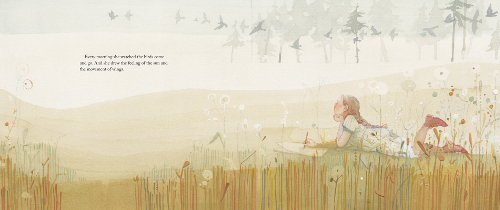The Feeling of Beauty Before Breakfast
 June 25th, 2020 by jules
June 25th, 2020 by jules
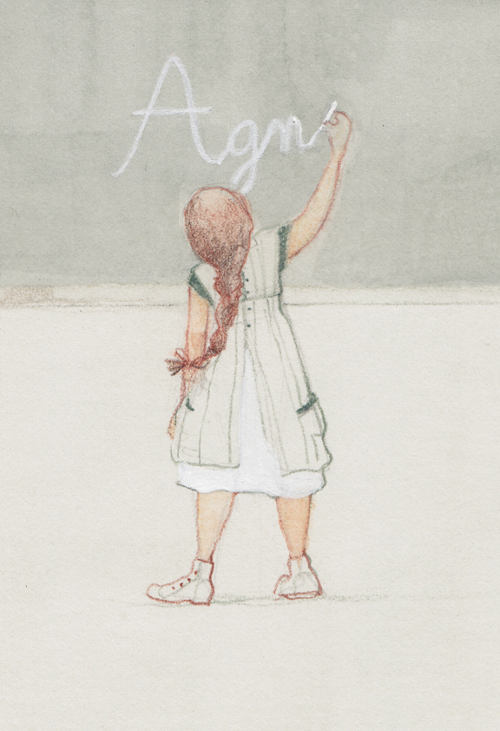
It’s my pleasure to share some spreads today from Tessa McWatt’s Where Are You, Agnes? (Groundwood), illustrated by Zuzanna Celej and coming to shelves in early August. This is McWatt’s picture book debut, and it’s a deeply contemplative, thoughtfully-executed story.
McWatt envisions the childhood of abstract painter Agnes Martin, born in Saskatchewan in 1912, imagining (as stated in a closing author’s note) that …
Agnes’s sense of beauty was stirred by the mysteries of life and death in nature that she would have observed in her daily life.
The book opens with young Agnes and her grandfather. They spot a rainbow and marvel at it. When, on the next page, her grandfather spontaneously covers her eyes and asks her if she still thinks the rainbow is beautiful, Agnes cries out, “Yes!” and feels “something tingling inside.” Agnes is amazed and mystified by the ability to see beauty in her mind’s eye and wonders if that is the case for everyone. Having been greatly impacted by this moment and her grandfather’s words, she picks up her favorite pencil and starts to draw, noting the shapes of what she sees, as well as drawing “the feeling” of what she sees.
The book’s repeated refrain is the book’s title, her mother often calling for her daughter. But Agnes doesn’t hear, as she follows the “criss-cross lines in her mind,” observing the world closely and trying to capture what she sees and intuits. When her family moves from the prairie to the big, busy city, Agnes seeks out nature where she can, continuing to draw.
Agnes thinks deeply about the natural world, asking her grandfather one day why things have to disappear. Later, her grandfather dies, the moment captured tenderly and strikingly in a spread with merely his empty chair and his cane hanging from it. Agnes despairs (“She could not find joy”) but remembers his words about how things that seemingly disappear can live on where “something real is felt.” Agnes continues to trace this ineffable feeling — “the feeling of beauty” — and, McWatt writes, “beauty became the mystery she traced her whole life.”
Celej’s softly colored illustrations — rendered via watercolor, collage, and colored pencils — are delicate and fine, capturing in remarkably muted earth tones Agnes’s world. The element of collage creatures textured layers in several spreads — but is used subltly and sparingly. These moments will have you leaning in to the book, maybe reaching out to touch the pages.
A closing author’s note gives more information on the life of Agnes Martin, McWatt making it clear that this is an imagined tale and an adaptation of one particular anecdote from Martin’s life. She quotes Martin as having once said: “Beauty is an awareness in the mind.”
And she drew the feeling of the sun and the movement of wings.”
(Click spread to enlarge)
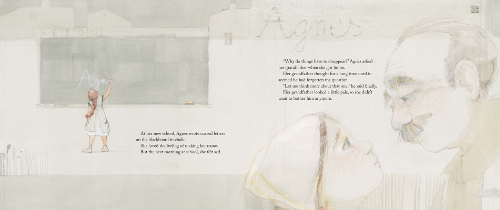
(Click spread to enlarge and read text in its entirety)
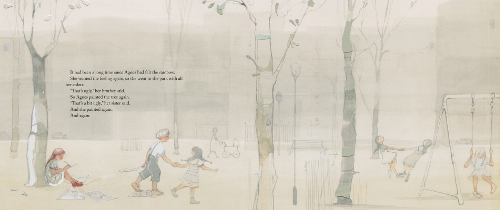
(Click spread to enlarge and read text in its entirety)
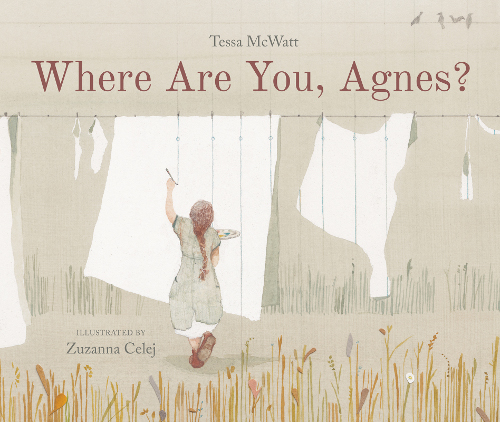
WHERE ARE YOU, AGNES? Text copyright © 2020 by Tessa McWatt. Illustrations copyright © 2020 by Zuzanna Celej and reproduced by permission of the publisher, Groundwood Books, Toronto.
